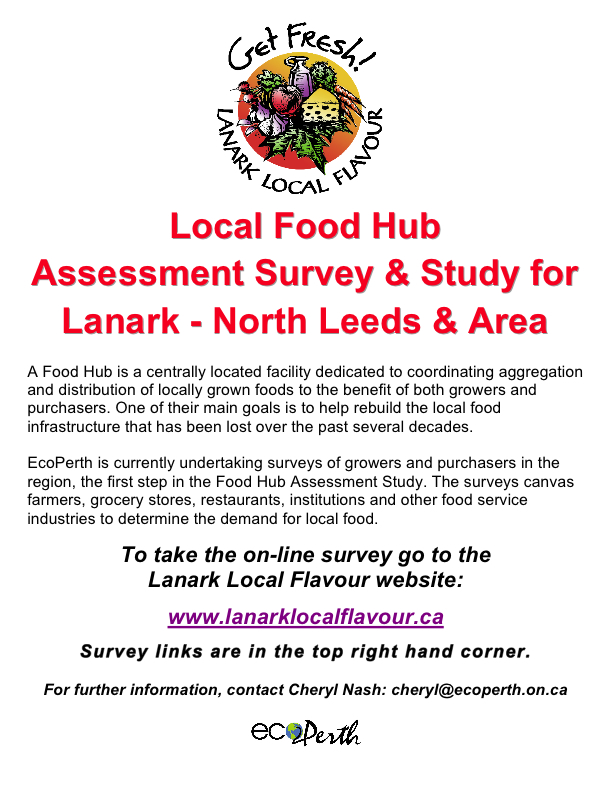Local Food Hub Project Moves Forward
It wasn’t that long ago – living memory for some of us — that our part of Eastern Ontario had a thriving local food infrastructure. Farmers were growing food that was destined for local consumption. There were facilities for long-term storage, food aggregation, as well as collective marketing and distribution. The last few decades, with centralization, specialization and globalization, have seen the steady destruction of this infrastructure. Even with the rapidly growing interest in local food, there is a mismatch between the growers and the commercial buyers. It is this mismatch that ecoPerth hopes to address with an ambitious Food Hub Assessment Study for a Local Food Hub in the Lanark County and North Leeds Region.
The Food Hub concept is an innovative approach to local food distribution that is rapidly moving into the mainstream in Canada. Although Food Hubs can appear in many different forms, they are essentially a centrally-located facility dedicated to coordinating aggregation and distribution of locally grown foods to the benefit of both growers and purchasers.
“Food Hubs are an important link in the local food chain,” Cheryl Nash, ecoPerth representative, explained, “It answers the questions like how best can local growers and farmers aggregate, process and market their goods? How can they most easily get what they grow into the hands of purchasers?” With similar projects cropping up in other areas close to home like Ottawa and Hawkesbury, local Food Hubs can also provide the opportunity to link different regions and resources. With the imminent introduction of Ontario’s Local Food Act, the Lanark County and North Leeds Food Hub project couldn’t be timelier. The Act could lead to an increased institutional demand for local food and the Food Hub would provide a key infrastructure component to accelerate the local food movement in this region.
EcoPerth envisions the Lanark County and North Leeds Food Hub project to not only represent a storage and distribution facility but eventually become a community facility with equipment sharing and one where growers and purchasers can take advantage of valuable resources and training. Potential facility locations are being explored in the Smiths Falls area due to its central location and accessibility to both growers and markets in Eastern Ontario. EcoPerth took on the project as the result of a local food networking event held last November where both farmers and buyers expressed a need for some form of coordinated production, marketing and centralized purchasing. Thanks in part to funding received from the Eastern Ontario Development Program (EODP), through Valley Heartland, the Food Hub project is now moving full steam ahead.
EcoPerth is currently undertaking a survey of growers and purchasers in the region, the first step in the Food Hub Assessment Study. The surveys canvas farmers, grocery stores, restaurants, institutions and other food service industries to quantify the supply and demand for local food. The survey results will provide an accurate measure to allow producers to better supply directly to the available demand in the region.
The surveys involve direct telephone contact and interviews, but there is also an online survey for both growers and buyers. A link to the online survey is on the ecoPerth’s websites at www.lanarklocalflavour.ca or at www.ecoperth.on.ca. For more information about the Food Hub project you can contact Cheryl Nash via email at [email protected].

